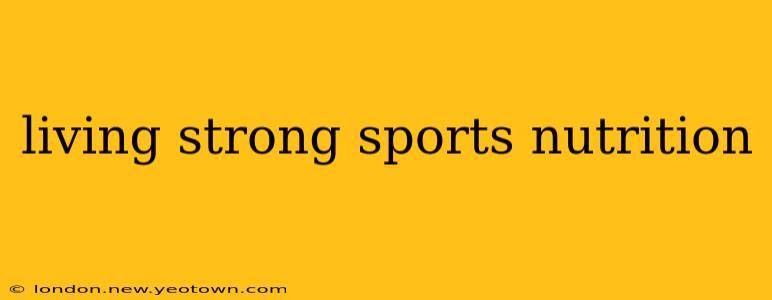The roar of the crowd, the thrill of competition, the sweat, the strain… the feeling of pushing your body to its limits. Whether you're a seasoned athlete or just starting your fitness journey, understanding sports nutrition is crucial to achieving your goals and living strong. It's not just about fueling your workouts; it's about optimizing your overall health and well-being to support a vibrant, active life. This isn't about restrictive diets or magic pills; it's about making informed choices that empower you to perform at your best. Let's dive into the world of sports nutrition and discover how to fuel your body for lasting strength and success.
What is Sports Nutrition, and Why is it Important?
Sports nutrition isn't a one-size-fits-all approach. It's a personalized strategy tailored to your specific needs, goals, and activity level. It’s about understanding how the food you eat impacts your training, recovery, and overall health. Think of your body as a high-performance machine; to keep it running smoothly, you need the right fuel. Poor nutrition can lead to fatigue, reduced performance, increased risk of injury, and even compromised immune function. Effective sports nutrition, on the other hand, provides the energy, nutrients, and hydration needed to train effectively, recover quickly, and prevent illness.
What are the Key Nutrients for Athletes?
This isn't about simply eating more; it's about eating better. Key nutrients athletes need include:
-
Carbohydrates: Your primary energy source, especially during intense training and competition. Focus on complex carbs like whole grains, fruits, and vegetables for sustained energy release.
-
Protein: Essential for muscle growth, repair, and recovery. Good sources include lean meats, poultry, fish, eggs, beans, and lentils.
-
Fats: Crucial for hormone production, cell function, and nutrient absorption. Choose healthy fats like avocados, nuts, seeds, and olive oil.
-
Vitamins and Minerals: Support overall health and performance. A balanced diet usually provides sufficient amounts, but supplementation might be necessary depending on individual needs and activity levels.
-
Water: Perhaps the most crucial nutrient for athletes. Dehydration significantly impacts performance and can even be dangerous.
How Many Calories Should an Athlete Consume?
This is a highly individualized question. The number of calories needed depends on factors such as:
-
Your training volume and intensity: Higher training volume generally requires more calories.
-
Your body composition and metabolism: Individuals with higher muscle mass typically burn more calories at rest.
-
Your overall health and goals: Calorie needs vary based on your goals (e.g., weight loss, weight gain, maintenance).
Working with a registered dietitian or sports nutritionist can help you determine your optimal caloric intake. They can assess your individual needs and create a personalized plan.
What Should Athletes Eat Before, During, and After Training?
Before Training: Focus on easily digestible carbohydrates for sustained energy. A light meal or snack 1-3 hours before training is ideal, depending on the intensity and duration of the workout. Examples include oatmeal with fruit, toast with peanut butter, or a banana with yogurt.
During Training (for longer sessions): Replenish glycogen stores with carbohydrate-rich drinks or gels.
After Training: Consume a combination of carbohydrates and protein to replenish glycogen stores and promote muscle repair. Examples include a protein shake with fruit, a chicken salad sandwich on whole-wheat bread, or Greek yogurt with berries.
What are Some Common Mistakes in Sports Nutrition?
-
Ignoring hydration: Dehydration dramatically impacts performance.
-
Neglecting recovery nutrition: Failing to replenish glycogen and repair muscles after workouts hinders progress.
-
Relying too heavily on supplements: A balanced diet is the foundation of good nutrition. Supplements should complement, not replace, a healthy diet.
-
Restricting calories excessively: This can lead to fatigue, injury, and impaired performance.
-
Failing to personalize a nutrition plan: Everyone's needs are unique. A one-size-fits-all approach won't work.
Living strong is about more than just physical strength; it's about overall well-being. Prioritizing sports nutrition is an investment in your health, performance, and overall quality of life. Remember, consult with a healthcare professional or registered dietitian before making significant changes to your diet, especially if you have any underlying health conditions. They can provide personalized guidance and help you create a sustainable plan that supports your goals and keeps you performing at your peak.

